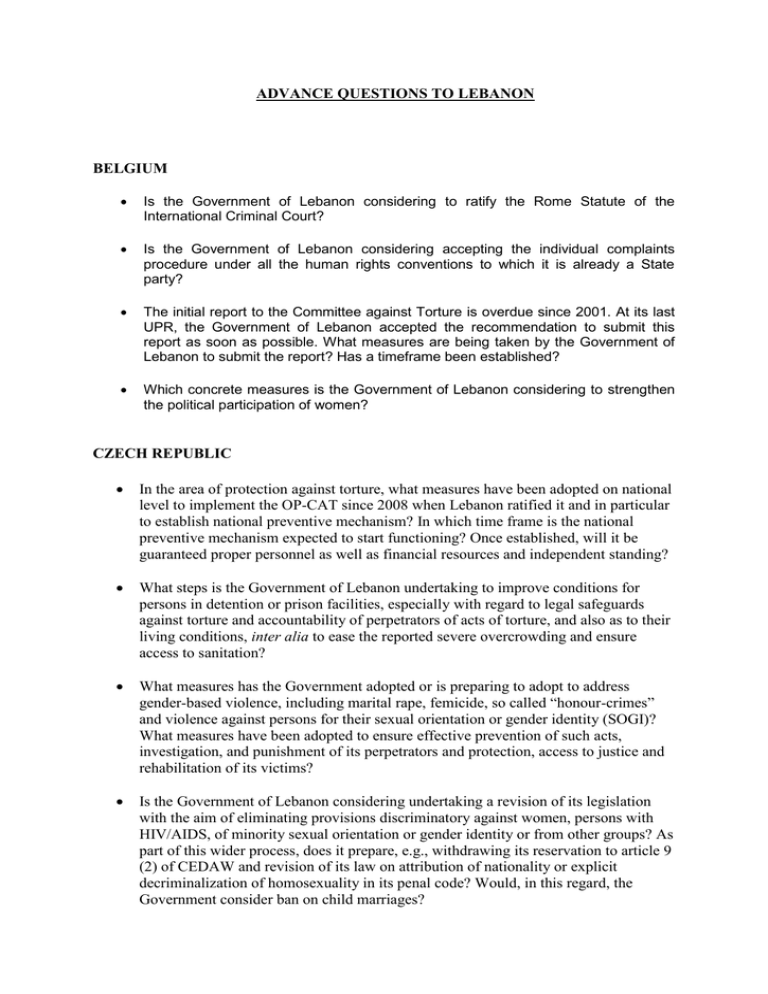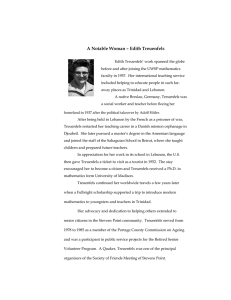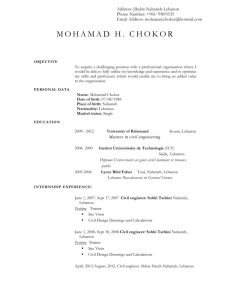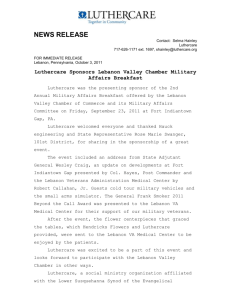ADVANCE QUESTIONS TO LEBANON BELGIUM
advertisement

ADVANCE QUESTIONS TO LEBANON BELGIUM Is the Government of Lebanon considering to ratify the Rome Statute of the International Criminal Court? Is the Government of Lebanon considering accepting the individual complaints procedure under all the human rights conventions to which it is already a State party? The initial report to the Committee against Torture is overdue since 2001. At its last UPR, the Government of Lebanon accepted the recommendation to submit this report as soon as possible. What measures are being taken by the Government of Lebanon to submit the report? Has a timeframe been established? Which concrete measures is the Government of Lebanon considering to strengthen the political participation of women? CZECH REPUBLIC In the area of protection against torture, what measures have been adopted on national level to implement the OP-CAT since 2008 when Lebanon ratified it and in particular to establish national preventive mechanism? In which time frame is the national preventive mechanism expected to start functioning? Once established, will it be guaranteed proper personnel as well as financial resources and independent standing? What steps is the Government of Lebanon undertaking to improve conditions for persons in detention or prison facilities, especially with regard to legal safeguards against torture and accountability of perpetrators of acts of torture, and also as to their living conditions, inter alia to ease the reported severe overcrowding and ensure access to sanitation? What measures has the Government adopted or is preparing to adopt to address gender-based violence, including marital rape, femicide, so called “honour-crimes” and violence against persons for their sexual orientation or gender identity (SOGI)? What measures have been adopted to ensure effective prevention of such acts, investigation, and punishment of its perpetrators and protection, access to justice and rehabilitation of its victims? Is the Government of Lebanon considering undertaking a revision of its legislation with the aim of eliminating provisions discriminatory against women, persons with HIV/AIDS, of minority sexual orientation or gender identity or from other groups? As part of this wider process, does it prepare, e.g., withdrawing its reservation to article 9 (2) of CEDAW and revision of its law on attribution of nationality or explicit decriminalization of homosexuality in its penal code? Would, in this regard, the Government consider ban on child marriages? Is the Government preparing revision of the legislation on protection of minors in conflict with the law so as to ensure its compliance with the CRC, inter alia through raising the age of criminal responsibility of children (currently 7 years of age)? What measures is the Government adopting to allow it to submit its long overdue reports to CAT (overdue since 2001), CRC (overdue since 2011 and since 2006 on OP-CRC SC) and HRC (Human Rights Committee, overdue since 2001) and systematically avoid such delays in the future? Does the Government intend to authorize the full publication of the findings of the 2013 confidential inquiry by the Committee against Torture? GERMANY What is the position of the Government of Lebanon regarding the conclusion of a new memorandum of understanding with the UNHCR in order to provide an adequate administrative framework to enhance protection of refugees? What inspection mechanisms are in place to prevent abuses and ensure regular payment of wages and decent working conditions for migrant domestic workers? What is the position of the Lebanese Government regarding the abolition of military jurisdiction over civilians? NETHERLANDS Torture What steps can Lebanon take to increase reliance on forensic and alternative interrogation techniques and to limit extraction of confessions and reliance on excessive force? Civil and Political Rights How can the Constitutional Council be more proactive in guaranteeing abidance by constitutional deadlines regarding elections and help guarantee the right to vote? Equal rights for women Which concrete steps has the government of Lebanon taken to ensure that women are treated in the same way as men in issues related to child custody, inheritance and divorce? Freedom of Expression and Internet Freedom Which concrete steps can be taken to protect bloggers and internet users from harassment and to guarantee their freedom of expression and privacy? Human Rights Which aspects of the Human Rights Action plan (drafted by the Lebanese parliamentary committee on Human Rights) can be implemented in the short and medium term despite the political stalemate in Lebanon? SLOVENIA We note a number of positive steps in the area of gender equality, such as the adoption of a law on domestic violence (Act. No. 293) and of a National Strategy for Women, but regret that Lebanon maintains its reservations to CEDAW, has not criminalized marital rape or banned child marriage, and that discriminatory provisions continue to exist in personal status law, national law, and the Criminal Code, in particular in relation to marriage, nationality, family relations, adultery, rape and abortion. We are particularly concerned that the Penal Code allows a rapist to escape punishment if he offers to marry the victim, and that women who have committed adultery can be imprisoned for up to two years for having consensual sex with someone other than their husband. We have several questions in this regard: o Would the state consider adopting a unified civil personal status law which would guarantee gender equality? o What is being done to increase the political participation of women? o How is the state ensuring that adequate and good quality contraceptive information and services are available and accessible to all women and adolescents, including migrant domestic worker, refugees and displaced persons? o What were the reasons for the rejection of the amendment to the Nationality Act which would have allowed Lebanese women to transfer their nationality to their husbands and children? What measures have been taken in response to the findings of the Committee against Torture which stated that torture was a pervasive practice and was routinely used by the armed forces and law enforcement? We're pleased to note the positive assessment by the Special Rapporteur on freedom of religion or belief of the unique tradition of religious diversity that exists in Lebanon. We understand, however, that certain positions in the country require applicants to identify with one or another of the dominant religious views. In light of this, how does Lebanon guarantee the freedom of belief to agnostics/atheists and ensures non-discrimination of persons belonging to minority religions? What is being done to ensure that birth registration is accessible to all children born in Lebanon, including refugee children and children of unregistered or stateless fathers? SWEDEN Sweden welcomes the passing of the Law on the Protection of Women and Family from Domestic Violence. How does Lebanon ensure that its judicial system applies a comprehensive definition of violence that includes economic, legal and psychological violence and abuse? Sweden greatly appreciates the attempts that have been made to combat the discrimination of women in society. However, women’s relative participation in the workforce remains low. Does the Government of Lebanon have any plans on how to increase women participation in the labour market? Sweden appreciates the steps that have been taken in order to remove some restrictions on the employment of Palestinian refugees by revising labour law. Has the revisions to these laws yet been implemented fully, and if not, why? Sweden notes that Lebanon voted in favour of ILO Convention No. 189 on Decent Work for Domestic Workers, but has yet to ratify it. Does the Government of Lebanon have any plans to ratify the convention and implement it into law? UNITED KINGDOM OF GREAT BRITAIN AND NORTHERN IRELAND As part of the implementation of the National Action Plan, what progress has the government made in ensuring that the legislation for the establishment of the National Preventative Mechanism is in line with the Optional Protocol of the Convention Against Torture (OPCAT), to which Lebanon is party since 2008? Noting the progress made on strengthening the capacity of the Lebanese-Palestinian Dialogue Committee, what is the government doing to support the Committee during the second phase of discussions and the substantive issues that they will cover, including property rights and right to work? Noting the progress made in passing the 2014 law to Protect Women and all Members of the Family from Family Violence, does the government have plans to introduce legislation which would expand the definition of domestic violence to be in line with the United Nations Declaration (1993) on the elimination of violence against women? The Ministry of Labour has referred to a sixteen-point plan on migrant workers. Can the government provide details of this strategy, to ensure better coordination between civil society, including on monitoring and implementation? Will the government allow the Lebanese people to exercise their right to vote on time in periodic elections, including parliamentary elections and the 2016 municipal elections? UNITED STATES OF AMERICA What steps are being taken by the Government of Lebanon to put an end to the political stalemate and restore the functioning of government institutions, including the cabinet, parliament, and presidency? What will the Government of Lebanon do going forward to combat corruption, inhibit the misuse of public funds, deter the bribery of government officials, and promote transparency and accountability? We recognize that marital rape and other serious abuses are not covered by the Domestic Violence Law passed last year. Is the government planning to take any steps to expand the definition of domestic violence in order to ensure that such abuses are investigated and prosecuted? What steps will the Government of Lebanon take to protect the rights to freedom of peaceful assembly and freedom of expression, including for example providing effective security measures to protect peaceful protesters? What measures are being considered to process the registration of civil society organizations in a timely manner in an effort to reduce the bureaucratic barriers required to officially register an NGO with the government, which can discourage smaller groups, such as women’s rights organizations or refugee service providers, from operating legally? What steps are being taken to investigate allegations of torture and other violations of human rights committed by government security force units? What specific steps are being taken to ensure the protection of members of vulnerable populations who face a heightened risk of abuse from security units such as lesbian, gay, bisexual, transgender and intersex (LGBTI) persons, refugees, and others? What steps are being taken to reform laws that may negatively impact the enjoyment of privacy rights, including Article 534 of the Penal Code, which criminalizes “sexual intercourse against the order of nature”? Would the government consider issuing a decree or order to stop prosecutions under Article 534? We note that Lebanon now has the highest rate of registered refugees per capita in the world and recognize the strain this has placed on Lebanon’s resources and host communities. What steps is the Government of Lebanon planning to take to manage renewals and regularization of status for refugees from Syria?




